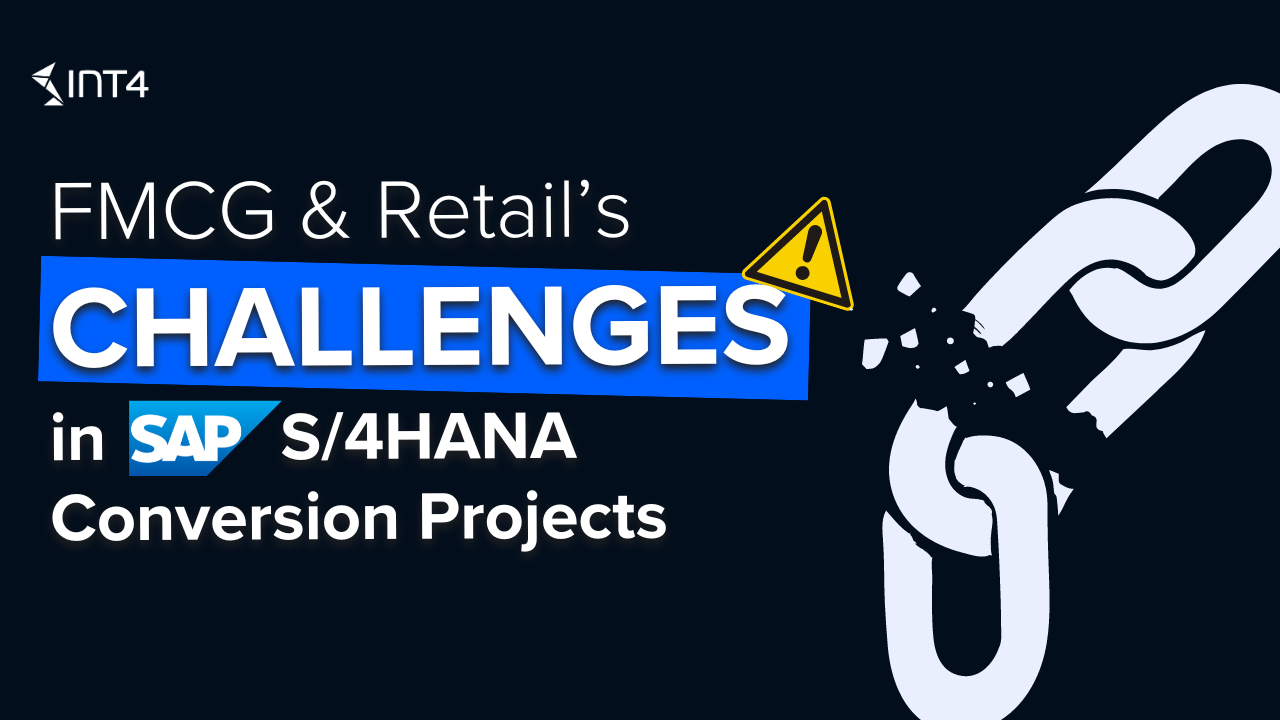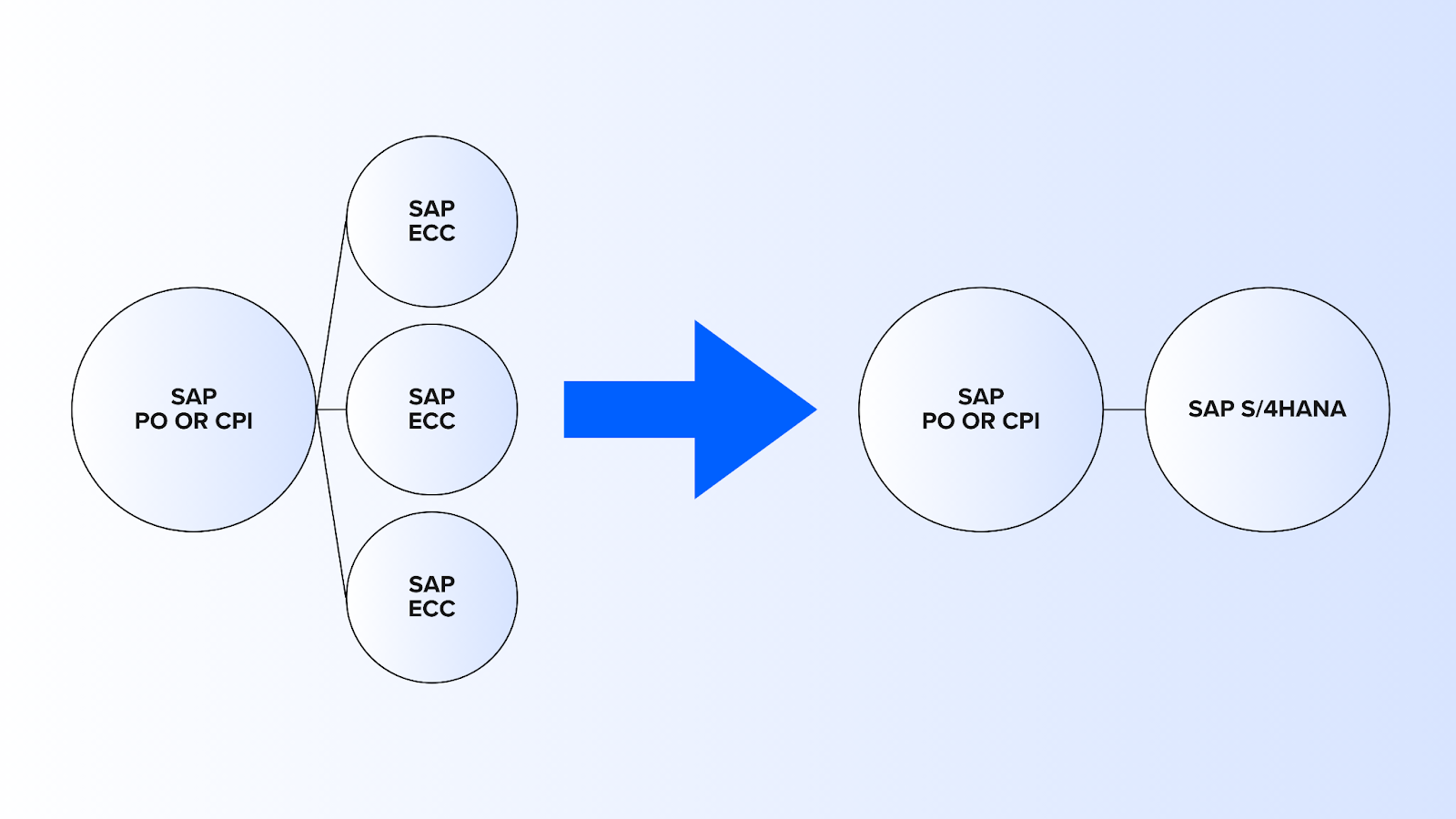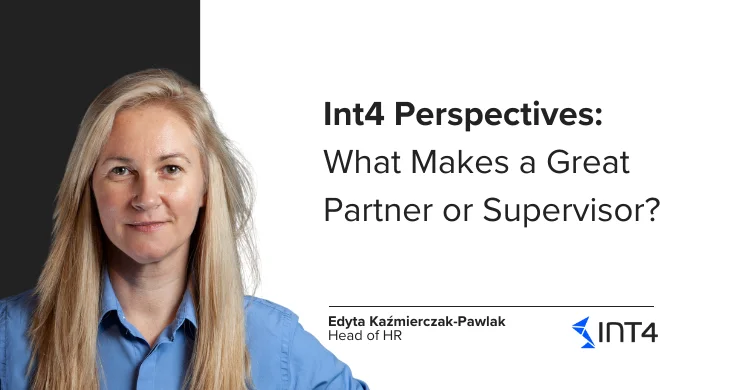6 Main challenges in SAP S/4HANA Conversion Projects for FMCG & Retail companies

SAP S/4HANA Conversion Project challenges for FMCG & Retail companies
SAP Landscapes of FMCG & Retail companies can make SAP S/4HANA Conversion Projects really challenging. So in this article, we’d like to shed some light on the main challenges that these types of projects can pose for companies in these industries.
The following article is based on the conversation between Mateusz Nowak and Michał Ibrom during one of the Int4 Webinars. Find the full conversation below:
Having said that, if you want to successfully deploy your SAP S/4HANA conversion project in Retail or FMCG environment – this article is for you!
Challenges for Retail & FMCG
Int4 Suite is an SAP API Testing and Service Virtualization platform that’s supporting some of the biggest Consumer Goods and Retail companies in the world in their SAP S/4HANA Conversion Projects. Thanks to this fact we can see the challenges that our enterprise customers face.
Here are 6 of the most important challenges that companies need to overcome in these kinds of projects:
Challenge #1 – Integration with significant number of connected applications and legacy systems
That’s one of the biggest and most common challenges. Because the SAP system you’re implementing is usually just one of many pieces of a larger puzzle of various IT systems integrated with each other.
The complexity and huge number of connected systems is one of the staples of Retail and FMCG companies, since there’s usually a need to exchange data with external systems. For example, this is usually needed to send and receive orders from different vendors.
Integration with a significant number of connected applications and legacy systems is a challenge in almost every type of SAP S/4HANA project – no matter if it’s a Greenfield, Brownfield or a Bluefield project. Because in each of those cases, you need to make sure that the third party applications integrated with your SAP system will act in the same way that they used to before the migration.
Shortly speaking you need to know if inputs and outputs remain unchanged.
The proper testing of the integration between the SAP S/4HANA system with the external world is essential to ensure business continuity.
And the main way that companies choose to test these connections is contacting the system partners and asking them for support – to send us data or to check if our message reached their system properly. And while such an approach might work for less complex environments, it’s rarely the best way forward for companies with a large number of connected applications. Complex SAP S/4HANA Transformations simply calls for different measures.
FMCG & Retail companies should instead try to eliminate the External Dependencies and use more scalable solutions that will let them ensure that their SAP system is working in the expected manner.
If you’re dealing with tens or hundreds of non-SAP systems and tens or hundreds of EDI partners, one of the solutions that you will find particularly useful in order to avoid project delays is the ability to simulate 3rd party systems, which is called SAP Service Virtualization. You can learn more about the benefits of Service Virtualization from this short video:
Challenge #2 – Separation of SAP implementation project and organizations managing legacy systems
Your Project Team may have different goals and priorities than other teams. For instance those managing legacy systems.
In such a situation, the lack of availability of your partners or other key resources may generate project delays. To help you better deal with this challenge, we’ve prepared an official Learning SAP (formerly openSAP) course called “Avoid SAP S/4HANA Project Delays with Third-Party Systems Service Virtualization”. It explains how virtualizing electronic messages from external applications and partners can help avoid delays and break dependencies.
Challenge #3 – Unmanageable quantity of interfaces
During SAP S/4HANA conversion projects, keeping the business up and running is a number one priority. But the nature of FMCG and Retail industries is that in order to conduct their critical business processes, they need to exchange messages via specific interfaces with many vendors, partners, legacy systems and connected applications. It’s not uncommon for the number of the interfaces to be counted in thousands.
And if you want to make sure that all of those thousands of interfaces work in the same way as before, you need to test all of them. What’s more – it’s usually not enough to have just one test case per specific interface. Because you have to collect different variations of messages and different mappings in the CPI or PO system.
The point being – creating a proper testing library is next to impossible if you want to create it manually. Once again, you can use modern tools such as Int4 Suite and its Robotic Crawler to create thousands of test cases in minutes:
Challenge #4 – Complex interfaces and a ton of dependencies between them
Not only do FMCG & Retail companies have an impressive number of interfaces, but the dependencies between them are usually complex as well. The change that you implement in one interface can affect many other interfaces that are dependent on the one that you’ve just changed.
This means that it’s not sufficient to test just one interface that is being changed – but you should also take into account every other interface that might be affected. But this would require you to test and retest thousands of interfaces even after making a minor change. Which – again – is not possible if done manually.
That’s the exact reason why Int4 Suite customers use Automated SAP API Testing to quickly retest thousands of messages – which accelerates the SAP Projects and improves their quality. See how you can use this capability in your SAP Project:
(The demo starts at 2:04)
Challenge #5 – Full Line of Business testing
Testing the interfaces and managing the dependencies between them is one thing. But some companies want to test whole business processes. Which is challenging because these processes usually go through several different systems. This means that in order to do it manually you’d need to have a lot of support from third party systems. Simply imagine testing your whole order-to-cash process.
With Int4 Suite you can test entire business processes independently from the partners and connected applications – and do it much earlier in the process. Below you can watch a simple explanation of the Component Based Testing explained with the order-to-cash process:
Challenge #6 – SAP Boxes Consolidation
Some of the companies decide to simplify their complex environment by consolidating several SAP ECC Boxes into a single SAP S/4HANA system.
This makes the whole development process and testing process even more complex. Because for example – all the additional rootings and mappings have to be taken into account.
Use Int4 Suite to overcome these challenges!
Int4 Suite is a tool designed to help you overcome SAP Integration Testing challenges. And the more complex your SAP environment is, the more useful the Int4 Suite becomes. See a review of Int4 Suite by Glynn Williams:
With the Int4 Suite being used by many Fortune 500 companies, it’s a great addition to you SAP S/4HANA testing toolstack.
If you’re planning or running an SAP S/4HANA conversion project and want to learn more about how you can utilize the powerful capabilities of Int4 Suite, schedule a discovery session with our team. See you soon!
Popular tags
ABAP int4 INT4 IFTT Int4Interview S/4HANA SAP AIF SAP CPI sap integration




